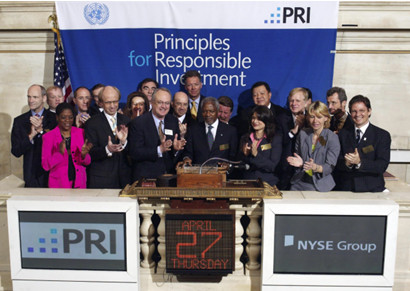Recently, I was reading a paper on reflexive law. Reflexive law is not really law. It is a concept presented with ivy league business school panache that when broken down to the basics seems more like a mechanism of extortion, bribery and racketeering. The paper is Green Business and the Importance of Reflexive Law: What Michael Porter Didn’t Say by Dennis D. Hirsch and Geraldine W. Powell, Professor of Law, Capital University Law School. The following are the significant excerpts:
. . . “green business,” defined as voluntary actions by a private firm that seeks to achieve better environmental performance and, simultaneously, to make the company more competitive.14 Until recently, many have assumed that corporate expenditures on environmental performance inevitably impose costs on the company, leading to a trade-off between environmental performance and competitiveness.15 “Green business” turns this idea on its head. It posits that investment in environmental performance can enhance, rather than detract from, business competitiveness.
. . . early on, Professor Michael Porter of the Harvard Business School set out a broad and compelling theory that seemed to address the issue.
. . . Porter argued that traditional technology-based standards, which push companies to adopt specific pollution control technologies, deter green innovation and so are “bad.”23 By contrast, outcome-based standards, which specify the environmental result but let companies figure out how to get there, encourage such innovation and are “good.”24 Porter concluded that the key to promoting green business is to substitute outcome-based rules for technology-based standards, good regulation for bad.
Yet Porter’s thesis has a problem. Outcome-based regulations will not work to motivate many green business activities.
Reflexive law is that missing piece. As coined by the German social theorist Gunther Teubner, reflexive law is law that fosters self-regulation.33 It consists of laws and policies that push private firms to: (1) internalize social goals (e.g. environmental performance goals) and adopt them as their own,34 and (2) creatively self-manage their operations so as better to achieve these goals.35 Reflexive law requires neither the specific technologies of traditional regulation,36 nor the specific environmental results of outcome-based rules.37 Instead, it uses tools such as information disclosure, stakeholder involvement, or planning requirements to motivate companies to undertake their own, self-directed improvement efforts, while leaving it up to the firms to determine both the means and the ultimate environmental outcomes.38
Years ago, I researched an affordable housing development in Star, Idaho about 20 miles outside of Boise. The development did not make economic sense. Curiously, the developer was owned by a holding company of the Arizona Public Service (APS) – a utility company. And what was a utility company doing developing homes through a holding company when the 1935 PUCHA law prevented utility companies from owning holding companies for unrelated businesses? The following are excerpts from previous research as I tried to solve the puzzle of what was happening to the small farm town of Star.
The Falling Star . . . Avimor, a development company out of Arizona was building a planned community of about 600 homes just outside of Star. There were several problems with that. First, there was no market for them. Of the homes that had been built, most were sitting empty and a few were rented. Star did not have the infrastructure for the development – and especially did not have the roads to support it if they did manage to sell the houses. They are miles away from the Interstate and at least a mile or so from the old highway. At the time, Boise’s economy was not doing well. The few large corporations in Boise were moving jobs out, cutting back and scaling down which in turn put the rest of the economy in decline correspondingly.
The parent company of Avimor was SunCor, an Arizona corporation. SunCor Development Company was a wholly owned subsidiary of Arizona Public Service (APS), Arizona’s largest electricity supplier. SunCor had thousands of acres of land under development in Arizona, Utah, Idaho and New Mexico. They also had developments in California and Mexico.
White Collar War . . . A company named Avimor built the homes. The parent company of Avimor was SunCor, an Arizona Corporation. SunCor, formerly named Energy Development Corporation (name change 1986), was a wholly owned subsidiary of Pinnacle West Capital, a publicly traded company (PNW). Pinnacle West Capital was also the holding company for Arizona Public Service, Arizona’s largest electric utility. . . a foreign owned rating company that gave Pinnacle West Capital it’s highest rating. Excerpt from a 2006 SunCor Press Release:
New York, 24 January 2006: Innovest Strategic Value Advisors, Inc. (ISVA) released its new electric power industry report covering the largest publicly traded electric power companies in the U.S. The Innovest analysis indicates that companies that take positive and proactive measures to address environmental, social, and governance factors (ESG) can capture significant benefits for shareholders. In line with this, Innovest found that the half of this group of electric power companies with better ESG ratings outperformed, on average, their below-average industry peers by 1700 basis points (or 17 percentage points) in total shareholder return (stock price appreciation plus dividends) over the over the past 3 years from November 2003 to November 2005. Additionally, Innovest’ results show that electric power companies with better environmental performance consistently outperformed laggards financially during the last seven years.
. . . Innovest Strategic Value Advisors is an internationally recognized investment research and advisory firm specializing in the analysis of non-traditional sources of investment risk and out-performance. Innovest’s major strategic investor is ABP, the largest pension fund in Europe, who owns a minority position. Its chairman, Jim Martin, was chief investment officer for TIAA-CREF, one of the largest pension funds in the world, for over fifteen years. The firm’s founder and Chief Executive, Dr. Matthew Kiernan, is a former partner with KPMG and director of the World Council for Sustainable Development in Geneva. In addition to ABP, the firm’s other clients include SSgA, T. Rowe Price, Neuberger Berman, Rockefeller & Co., Cazenove Capital, BP Investments, Henderson Global Investors, HSBC Asset Management, UBS and the England & Wales Environment Agency. The firm currently has over £1.1 billion million under direct sub-advisory mandates, and has clients in 20 countries.
TIAA-CREF is the teacher’s union pension fund. ABP is probably Europe’s equivalent.
As I put the puzzle together according to my understanding, U.S. corporations have sustainable development goals (SDGs) to meet and they self-report their progress on those social goals. It would appear that the European and U.S. teacher’s union pension funds were used as weapons of economic warfare against U.S. firms to participate “voluntarily” in the “go green” movement to meet those SDG social goals as calculated through the social ESG rating system. If the ESG ratings have equal or greater weighting than the financial status of the firms, the firms are virtually forced into social spending (to keep up the ESG ratings) in order not to have the price of their stocks and bonds driven down and/or it might determine the interest rate by which they can borrow.
The question is: were/are these pension funds also used against our cities, towns and states to force these public entities into what turns out to be communism? Is this the reason why city leaders are allowing parts of their cities to be burned down? Was Enron waging war against PG&E and the Portland utility to earn high ESG ratings and to have their stock soaring when they had no assets to speak of?
Continuing with the previous research titled White Collar War – a 2007 Innovest report was found. The following are excerpts from the “Innovest Strategic Value Advisors & the United Nations Principles for Responsible Investment”.
By providing institutional investors with enhanced research on environmental, social and corporate governance (ESG) issues, Innovest is helping PRI signatories fulfill their commitments to the Principles in a variety of ways. Whether signatories are interested in company ratings and quantitative ESG data, or engagement and advisory services, Innovest’s Products and Services are flexibly packaged and designed to meet investors’ needs.
Specifically, Innovest’s ‘i-Ratings’ is our client web portal where the following Innovest products and services can be accessed:
» Intangible Value Assessment (IVA) ratings and Company Profiles on over 2,000 companies.
» UN Global Compact Plus screening and assessment service on companies in the global MSCI index.
» Innovest Activities Screening – negative screening service
» Innovest Strategic Engagement and Advisory Services (ISEAS).
» Regular News Updates (Weekly Stock Monitor and monthly Client Delivery Newsletter).
» Sector Reviews and Reports on over 60 industries.
» Thematic reports – eg Carbon Disclosure Project.
» Innovest’s Carbon Finance and Clean Technology Practice including our Carbon Beta Platform and Carbon Portfolio Value Audits.
» Innovest Data Suite and asset management sub advisory services
Innovest’s Intangible Value Assessment (IVA) ratings are focused on the nontraditional factors which contribute most heavily to financial out-performance. Specifically, our ratings evaluate more 2,000 companies on 120 different performance metrics that fall under the following four pillars:
» Stakeholder Capital
» Strategic Governance
» Human Capital
» Environmental Management
The launch of the United Nations Principles for Responsible Investing was in April of 2006.
The heads of leading institutions from 16 countries, representing more than $2 trillion in assets owned, officially signed the Principles at a special launch event at the New York Stock Exchange. The Principles were developed during a nearly year-long process convened by the UN Secretary-General and coordinated by the UN Environment Programme Finance Initiative (UNEP FI) and the UN Global Compact.
The Principles
Crafted by more than 20 pension funds, foundations and special government funds, backed by a group of 70 experts from around the globe…
The Principles can be view HERE.
Is this why the National Education Association (teacher’s union) supports the LGBTQ agenda? Is that why Critical Race Theory is being taught in the schools? Have educators succumbed to extortion? Have they sold out American children for their pensions? I think the answer to that would be a resounding YES.
In 2011, this article was found on the India Times website. The article shows that the U.S. is a puppet to market pressures so there is no doubt that our cities, counties and states are also puppets. It explains a lot I think.
The following is a video clip from a recent hearing on Climate Change. I captured the clip because of the mention of Margaret Thatcher but also because what Sean Casten said sounded like a threat to me. I didn’t know what the threat might be – but there is a question in my mind – does it have to do with international pension fund managers and the ESG?
The following video is a clip of Professor Michael Porter speaking at President-Elect Bill Clinton’s conference on economic policy. Notice that Porter talks about U.S. corporate ownership (lack there of actually).
Are the Economic,
Social and
Governance (ESG)
indicators
derivatives?









5 Comments
Kristin
Jeez. Vicky- this is so damning- I am physically in Arizona, and a customer of this APS (our utility) and I have heard of Suncor. I had no idea of ANY of this, and even had I known, I was unaware until now of the 1935 PUCHA law “************** a utility company. And what was a utility company doing developing homes through a holding company when the 1935 PUCHA law prevented utility companies from owning holding companies for unrelated businesses”*******************. By the way, how would you have known of it, VIcky?? I know your mind is a steel trap, but that’s a thing I don’t think is commonly known. I’m VERY worried- not so much of what is happening, but that nobody seems to heed the alarms. If enough persons actually comprehended what is going on, enough right persons- we could stop this. We’d at least have a fighting chance. Maybe we do?? Can we actually change it? Maybe we have tried- maybe we’re outgunned. I don’t know. Thanks VIcky. Keep well, we need you. And don’t fall!
Vicky
How did I know about PUCHA of 1935? It’s hard to say. I read a lot of things when I’m researching. I also worked for the largest utility company in NY State (probably the country) on their cost accounting system for outside plant fixed assets – installed materials. They had to keep a record of every run of wire, conduit, box, etc plus the cost of labor, etc. because electricity pricing was highly regulated – cost plus a margin. That’s why utilities were a safe investment – there were no surprises and the income was stable. I was told that the Vice President of the Cost Accounting division whose system I worked on, wrote the book on utility service pricing that was the industry standard for a lot of years.
I also followed the Enron arbitrage investigation after their stock imploded and they’d robbed electric utility ratepayers in Southern California. In about 2005, I watched the Senate debate on repealing PUHCA. I’ve never seen a Senator so desperate and flustered as Senator Pete Domenici was when he was arguing for passage of the bill. He was sweating profusely and he was nervous as hell. He couldn’t even formulate a good argument – what he was saying was nonsensical. Since the repeal was in 2005 and by that time, the developments that APS was building all over the west had to have begun prior to 2005 so they were in violation of the Act when they established the holding company that building the homes.
Kristin
PS- I forgot to say my piece on Outcome Based Standards, and how they ” want to substitute outcome-based rules for technology-based standards” – does this actually quantify- if that’s the word, those buildings and everything that went nowhere in Idaho?? That is, it’s no more profits to hope for, but “technology standards”?? is that right? Someone explain to me, how two and two aren’t to make four, but 3? This is akin to denying the laws of thermodynamics. Vicky your prediction about us going back to the 7th century may not be so fantastically impossible. I think that’s where we’re headed- we’re going to have the Ottoman Empire all over again, an empire of great minds! Libraries! where no one does anything except smoke and talk about all the great things and outer space, and be in a desert where everything one eats, drinks, everything is imported. That’s a failure, total failure.
Vicky Davis
The idea of outcome-based standards is to allow “market creativity” in solving the problem. Rather than the government mandating a particular solution to get to net zero for example, they tell the car companies, we want net zero emissions by some year in the future. They then let the car companies figure out how to do that. There is a lot of room for psychopathy between an outcome-based standard and a mandated solution.
The other day I went to the grocery story. There was no salvation army bell ringer and pot. There was just a box with a slot and a sign that said for over 90 years the salvation army has provided service to people in need in Twin Falls. That hurt my heart. It was the first time in my lifetime of memories that the Salvation Army wasn’t there ringing the bell. Obviously, the Salvation Army was severely damaged by the announcement that they required their executive and managers to receive CRT Training. My reaction when I heard that was **** them, I’ll never again give them a donation. Recalling the Boy Scouts and what was done to them, it occurred to me perhaps that was an intentional attack on the Salvation Army to put them out of business? Did they trade all of the small donations for one very large donation with strings – CRT a requirement? I don’t but one thing for sure, it’s another piece of American tradition destroyed.
You’re right. Why is nobody doing anything about this? The American political establishment are the biggest traitor coward scumbags in the history of the world – except perhaps for the Vichy French who cooperated with Hitler when he invaded France.
Kristin
G@damit Vicky- came to clarify my mistake “profit”- I meant to write “Results”-& not ‘profit’. I get the tech-based vs outcome based. Your explanation is very good. This is my Second Writing of this reply, as my morning comment went Poof! Here we go again. Just as an aside, Vicky, why aren’t you teaching at one of the world’s universities? I can see your being featured as a guest speaker on loan from some Scandinavian University, or even Oxford- there are some very smart people out of there. Ok so that paper https://thetechnocratictyranny.com/PDFS/Green_Business_and_the_Law_Michael_Porter.pdf was particularly fascinating. It was read again this morning, the part you’ve explained (and so well!) in your reply, oh my gosh- they are like the Vichy very much so and we ARE occupied by Nazis- Fascists, “corporatists”. The whole movement going on today, the social one, reminds me of the blood lust of the horrible criminals that murdered those kind, decent people the Royals, how are the French any better each era a new socialist regime. Who was it, who said something along the lines of out of the French women we get the world’s socialists? Vicky I wish everyone would read that Green & Law paper. It’s a stupid idea to demand say Zero emissions by year 202-something, or half of output in emissions by ?? date. It’s like telling an ice cream man Hey! you’re to drive your ice cream truck around, but you can’t put 3*(%Y blah blah carbon in the air past 5pm. Ice cream man can’t drive around AND make money at his capitalist business, oh maybe if I were to delegate the cone delivery to Uber and Grubhub oh HEY Presto, lah dee dah let the dumbs who drive Grubhub deal with those emissions. Is that how it works? I get the feeling that’s what they’re doing, too. OH gosh my emissions, hm maybe if I send this manufacturing to crapistan they can deal with the carbon, not me, and I get to keep my company. Just to make sure everybody knows, you can NOT not have industry (manufacturing really) and prosper, in fact, it won’t survive. America is losing, has lost it.